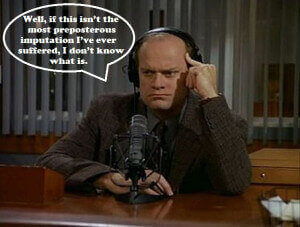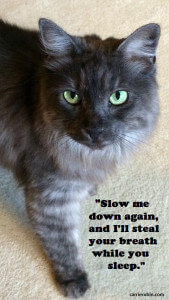 Our thanks to author Carrie Rubin for this guest post!
Our thanks to author Carrie Rubin for this guest post!
“It seems to be a pattern that if there is a normal word and an unconventional word, you pick the unconventional one. Sometimes that puts another speed bump in the reading. Like you are just finding all the ‘big’ words to show off.” —a beta reader
Ouch.
The above quote comes courtesy of one of my beta readers last year. The comment took me by surprise, not because I didn’t welcome feedback—I did. But because I didn’t consider the chosen word, which was “fugue,” to be big or unconventional. I considered it completely normal.
So that’s when it dawned on me: I’m a Frasier Crane.
Why?
Big words fly out of my mouth like bats fly out of a cave. Toss me an “arduous” or a “superfluous,” and I’ll take it. But I assure you, arrogance and pomposity are not to blame. Medical training is.
Shortly after med students flock the university halls, a complex lexicon takes over. Soon we’re using words like involute and atrophy, viscous and sanguineous, idiopathic and efficacious, emesis and tussis.

My mother’s cat. She’s not named Diva for nothing…
Of course, we also use words like poop and booger, but that’s immaterial. Sorry, extraneous. Sorry, beside the point.
What I’m trying to say is these words become part of our vocabulary even outside the medical venue. Sorry, environment. Sorry, home.
I’m sure the same happens to you. Whether you’re a mechanic or teacher, lawyer or landscaper, hair stylist or information technologist, your professional background gives you your own lingo.
But for those of us who write, those unconventional words can find their way into our fiction and slow down our readers.
And ain’t nobody got time for that.
So, what did I do?
Upon my beta reader’s discerning observation—sorry, astute; sorry smart—I removed the offending words. Or so I thought.
Recently, after months of distance, I read through my “polished” manuscript again. This time around, I found a few more words that took me out of the story, just as my keen beta reader had observed.
So I deleted those lingerers. (Except for “fugue.” That stayed in.)
That’s not to say no Frasier Crane words remain. In fact, there are plenty. But hopefully I’ve limited them to the appropriate context. For example, my nurse protagonist making medically related points or my lawyer strutting his stuff. But for the average, everyday narrative, I tried to kick them to the curb.
But indubitably I missed a few.
After all, Frasier Crane is never far away.
Are you the type of writer who uses lots of big words, whether in your book or blog? Think on toning ’em down a bit… if only to keep your readers firmly planted in your story!
 Carrie Rubin is the author of The Seneca Scourge
Carrie Rubin is the author of The Seneca Scourge, a medical thriller. For full bio, click here.

I’m different. I like big words in a story because it provides an opportunity to learn. They are easy to discern based on context. They are fun!
PS my spouse is a doctor and almost always beats me at Scrabble with his medical words. Not fair!
Too funny! Agree – we all need to learn more big words — tough though, especially when teaching authors blogging skills (and my doctors are lawyers are the WORST) because blogging is “drive by reading” — sentences and words need to be short and able to be read fast, fast, fast…
My husband knows the medical words too, but I still beat him at Scrabble. 😉
Enjoyed the post, however, you did leave out the word apoptotic. My word of the week. Sounds great and no one has any clue what you are talking about. Also makes the medical students ooh and ah. Looking forward to following your blog. I enjoy your humor. Sometimes that can get lost in medicine. Take care!
Thanks, Roger – Carrie’s a HOOT and looking forward to hooking the two of you funny physicians up together – Enjoy the day!
‘apoptotic’—Yes! That’s another good one. Thank you!
Often the “big words” take up less space, are stronger with their impact.If anyone uses a thesaurus this issue gets exemplified as differences are subtle, and need to be pertinent to the situation. That’s quite a mouthful! I prefer to keep things succinct. Different genres different needs and expectations! I love variety a good reader does too! Don’t we educate ourselves with words?
“Don’t we educate ourselves with words?”—I like to think we do!
I hear and understand both sides of this: when one is not being pretentious and just using the (prodigious, commodious, big) words that come naturally, it’s frustrating to have to change one’s voice to be “more marketable.” On the other hand, if a word comes across like a “speed bump” and takes a reader out of story, should it be used?
My thought is: who is your audience? Is your reader the one who will pick up a Michael Chabon or a Sarah Addison Allen? To me, both are brilliant writers. When I read one of Sarah’s novels, I am struck by how much visual color she can put into some of the simplest sentences. And when I read Chabon, I keep a dictionary by my side, because sooner or later, I’ll come across a word that’s unfamiliar to me. My point being, both writers are “marketable.” Both writers are great writers. Definitely have a good editor and reliable WIP readers, but we writers should stay true to our own voice and only change what seems unnatural to that voice. That’s what a reader relates to — the voice of their favorite writers.
I agree–knowing your audience is important. I try to use that as my guide now when I’m debating whether to change a word or not. Thanks!
Great post Carrie. We are kindred spirits. My excuse is architecture school and academic research, but I also think it’s a symptom of being an avid and broad reader. I recently wrote this post on the same topic: http://www.maryannclarkescott.com/are-you-an-over-educated-word-snob/
Every time you (as I did) jokingly self-edit, I cringe and feel regret, because I always prefer your first choice.
Irrefutably this is a truth of the modern world, with it’s universal access to online information in smaller and smaller bites, and it’s ever shrinking attention span. I wonder, though if it is a good trend, or whether we ought to be fighting back. And I just wish it weren’t so. If reading more expands one’s vocabulary and comfort with a richer English language, then how can others benefit if the available texts get progressively dumber? This is a conundrum I cannot solve.
I agree we should put up some resistance. As you say, how can we benefit future readers if we keep things overly simple? The English language is flush with wonderful words. We should learn and use as many as we can. In my Frasier Crane opinion, anyway…
Positively, absolutely, categorically and unequivocally 🙂
Really great post, Carrie. Funny and gently reminds us to think of our readers as we choose our words. Nicely done.
Thank you. 🙂
I’m not a medical student, but I am an English teacher, and I have a normal vocabulary that includes “fugue” and “efficacious” — which I learned at my mother’s knee. There was a time, when I was a child, when everyone I knew spoke intelligently with words of more than one syllable, so I have been repeatedly surprised and dismayed at the downward turn our language has taken in the past 50 years. My editor exhorts me to “use words suitable for a fifth grader” or “dumb it down.” Thus, my manuscripts now contain what I feel is pedestrian, but marketable, language. Yesterday I was about to use another word for “big” only to realize that the only acceptable synonym would be “large.” It’s a sad commentary on the health of a language that used to be robust and colorful. We have a variety of words with similar meanings, but sometimes only one special word conveys the exact meaning that we intend. Oh, for the days of Dickens.
Indeed, Sharon… I find it’s made me lazy, too. A few years back I picked up a book (and then all of them) by a favorite author, Michael Malone… Took me a few exhausting pages to realize that he was one of the few contemporary authors still writing in complex sentences! So, let’s continue to sneak in a fugue here and there, when we can, eh? Should be no excuse when a reader can click that new word right in their Kindle or iPad and look it up!
“sometimes only one special word conveys the exact meaning that we intend”—Exactly. I find that too. So I usually end up going with it and hope the editor will leave it in. 😉
Sadly, I do this when I’m talking as well. That’s why my friends look at me askance–er, oddly.
Hilarious, Jennifer… I hear ya, but you just be you (some of us still speak in complete sentences…)
My kids do the same to me. Then again, my college son can come up with some vocab doozies too!
I have a poster on the door of my office that expresses this, I think. It reads:
SOMETIMES I USE WORDS I DON’T UNDERSTAND
SO I CAN SOUND MORE PHOTOSYNTHESIS.
Hilarious, Gregory – thanks for sharing!
I love that!
What a fun post. And stupendously (oops, very) important. Love beta readers, gatekeepers for the reading public.
Agree, JL – Would be a good post on finding quality beta readers 🙂
Thank you. I agree–a good beta reader is a gem to find!
This is important advice that I also share all the time with my public speaking clients. There’s no quicker way to lose an audience than by using jargon, acronyms, and pretentious words. In fact, here’s a short video that demonstrates the other side – the reward for using precisely the right words:
https://www.youtube.com/watch?v=QYcXTlGLUgE
Thanks, Steve and for the video link – we’ll share away!
Thank you for that link. What a great video.